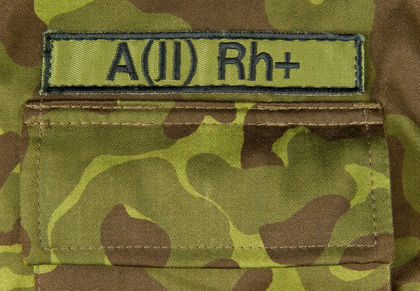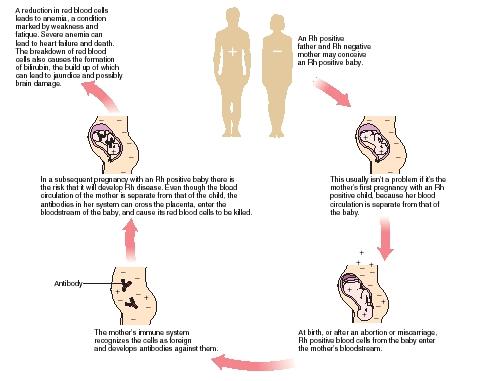Rh factor

Rh factor is a protein called an antigen that is found on the red blood cells of most people. (An antigen is any substance that the body considers "foreign" and thus stimulates the body to produce antibodies against it.) Rh factor, like the blood types A, B, and O, is inherited from one's parents. A simple blood test can determine blood type, including the presence of the Rh factor. About 85 percent of white Americans and 95 percent of African Americans have the Rh factor and are known as Rh-positive. Those without the Rh factor are Rh-negative.
Rh factor in pregnancy
Rh factor plays a critical role in some pregnancies. If a woman who is Rh-negative becomes pregnant by a man who is Rh-positive, the fetus may inherit the Rh factor from its father and be Rh-positive. If the blood of the fetus becomes mixed with the mother's Rh-negative blood, a disease called erythroblastosis fetalis can occur in future pregnancies, resulting in destruction of the fetus's red blood cells, brain damage, and even death.
The mixing of blood does not normally occur but may take place before or during birth if a tear in the placenta (the organ through which nutrients pass from the mother to the fetus) allows some fetal blood to enter the mother's circulatory system. If this happens, the fetus's red blood cells bearing the Rh factor stimulate the mother's white blood cells to produce antibodies against the foreign antigen. The mother's blood is now sensitized to the Rh factor.
Once a mother's blood is sensitized, the antibodies her body produces in response to the Rh antigen can cross the placenta and attach to the red blood cells of any Rh-positive fetus that she carries. This results in the rupture of the fetus's red blood cells, causing anemia (a condition marked by weakness and fatigue due to a reduced number of red blood cells). Severe anemia can lead to heart failure and death. The breakdown of red blood cells also causes the overproduction of a reddish-yellow substance called bilirubin. An infant with high levels of bilirubin will develop jaundice (have a yellowish appearance) and may suffer brain damage.
Prevention of erythroblastosis fetalis
Erythroblastosis fetalis can be prevented by administering a preparation of anti-Rh factor antibodies to an Rh-negative mother whose blood has not yet produced antibodies to the Rh antigen. The preparation, known as Rh immune globulin, rids the mother's blood of fetal red blood cells before she can become sensitized to them. Rh immune globulin is given whenever there is a possibility of fetal blood mixing with maternal blood, such as following childbirth, an abortion, a miscarriage, or prenatal testing.
Treatment for erythroblastosis fetalis
Treatment for erythroblastosis fetalis depends to what extent the fetus is affected by the action of its mother's anti-Rh-factor antibodies. A fetus whose red blood cells are being severely destroyed can be treated

with transfusions (replacement) of Rh-negative blood while it is still in the uterus. If the fetus shows signs of illness close to its anticipated birth, the physician may elect to deliver the baby early. The baby's blood is then replaced with Rh-negative blood following birth.
A pregnant woman who is already sensitized to the Rh antigen can have her doctor carefully monitor the level of antibodies in her blood throughout her pregnancy. If the levels rise, the fetus will need special attention. Unfortunately, once a woman is sensitized, she will always produce antibodies when exposed to the Rh antigen.
Words to Know
Antibody: A protein produced by certain cells of the body as an immune (disease-fighting) response to a specific foreign antigen.
Antigen: Any substance that the body considers foreign and that stimulates the body to produce antibodies against it.
Bilirubin: Reddish-yellow substance produced by the breakdown of red blood cells.
Erythroblastosis fetalis: A disease of fetuses and newborns caused by the mixing of fetal Rh-positive blood with maternal Rh-negative blood and resulting in rupture of fetal red blood cells.
Placenta: The organ formed during pregnancy in mammals through which substances are exchanged between mother and fetus.
Protein: Large molecules that are essential to the structure and functioning of all living cells.
Sensitization: The initial exposure to a specific antigen that causes an immune reaction in the body.
[ See also Antibody and antigen ; Blood ]